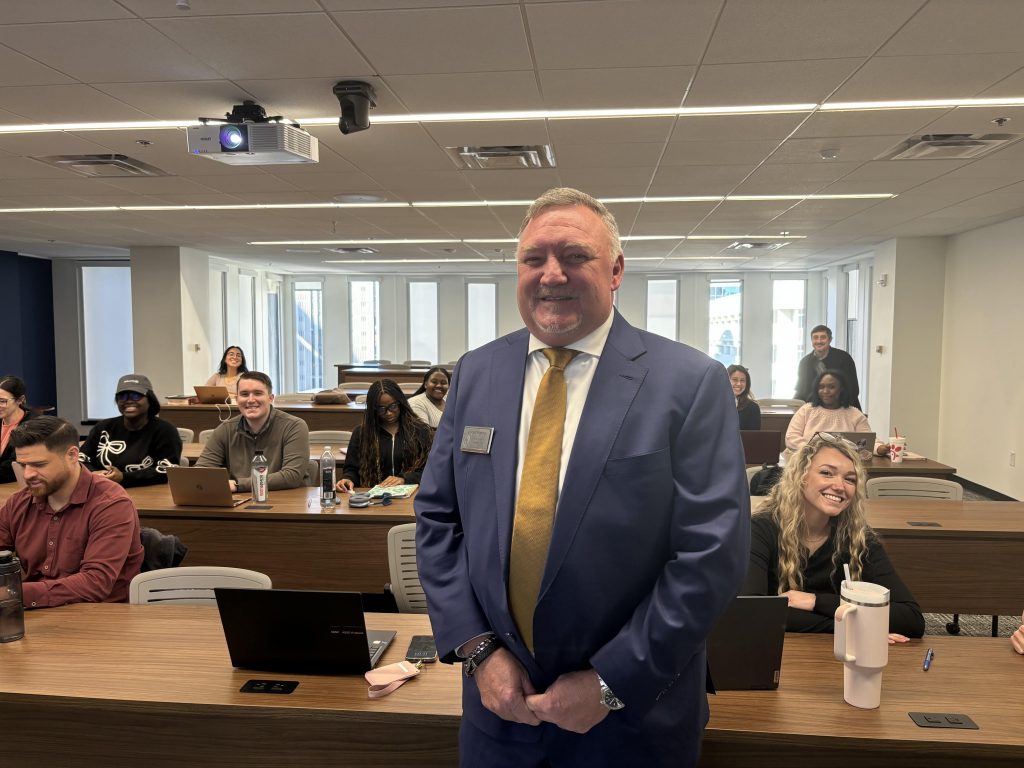
In a compelling and insightful lecture, Chief Judge Scott Smith of the Cherokee Judicial Circuit Superior Court—serving Bartow and Gordon counties—spoke to first-year law students in Professor Michael Mears’ 1L Art of Advocacy class. With over 19 years of experience, including nearly five as a chief judge, he shared valuable insights on courtroom advocacy and the legal profession. His visit was particularly special, as he was not only addressing future advocates but also speaking in the very class where his daughter, 1L student Molly Smith, was a student. His message was clear: successful advocacy is not just about legal knowledge but also about passion, preparation, professionalism, and integrity.
Finding Passion in the Law
Judge Smith urged students to pursue a legal career in an area that genuinely interests them rather than simply chasing financial success. He shared his own journey into law, sparked by the popular crime drama Miami Vice and his experience as a prosecutor. He reminded students that law is one of the three great professions—alongside medicine and theology—because it governs the rules and functions of society.
The Core Principles of Effective Advocacy
At the heart of his lecture, Judge Smith outlined the qualities that define a strong advocate:
- Be Prepared – Know your case thoroughly, research legal issues in advance, and anticipate challenges before they arise.
- Advocate Clearly – Judges and juries should easily understand the key arguments of a case without confusion.
- Be Firm but Fair – Strong advocacy must be balanced with ethical responsibility and professional integrity.
- Master Courtroom Presence – Advocacy extends beyond words; confidence, body language, and persuasion play a critical role.
- Understand Jury Psychology – Building rapport with jurors through attentiveness and sincerity can make a significant impact.
- Be the Quarterback – Lead the case with confidence and organization, ensuring smooth courtroom navigation.
Judge Smith reinforced that advocacy is about making clients’ voices heard within the bounds of the law. Ethical practice and professionalism are not just recommended but essential to maintaining credibility in the legal field.
The Power of Reputation
A lawyer’s most valuable asset, Judge Smith emphasized, is their reputation. A single act of dishonesty—whether misleading the court, misquoting case law, or presenting false information—can have lasting and irreversible consequences. He cautioned students: “Once you lose your name and your integrity in this profession, you will never get it back.”
The legal community, despite its vast reach, remains a small and interconnected network where character and honesty determine a lawyer’s long-term success.
Balancing Life and the Law
Beyond the courtroom, Judge Smith reminded students of the importance of personal well-being. He recounted the story of a law student who suffered a mental breakdown due to immense stress, using it as a warning against neglecting self-care. He encouraged students to maintain their mental health, nurture relationships, and engage in interests outside of law. “If you have no sense of self, then you have no sense of being an advocate,” he stated.
A Higher Calling
Closing his remarks, Judge Smith left students with a powerful reminder that being a lawyer is not just a career but a responsibility. Lawyers have the opportunity to make a tangible difference in the lives of their clients and in the justice system as a whole. He urged future attorneys to approach the profession with both skill and integrity.
His final piece of advice resonated deeply with students:
“Be a person first. Be a lawyer second.”
Judge Smith’s words served as an invaluable lesson for aspiring advocates, reinforcing that true courtroom success is built not just on legal acumen, but on ethics, professionalism, and an unwavering respect for the law.
